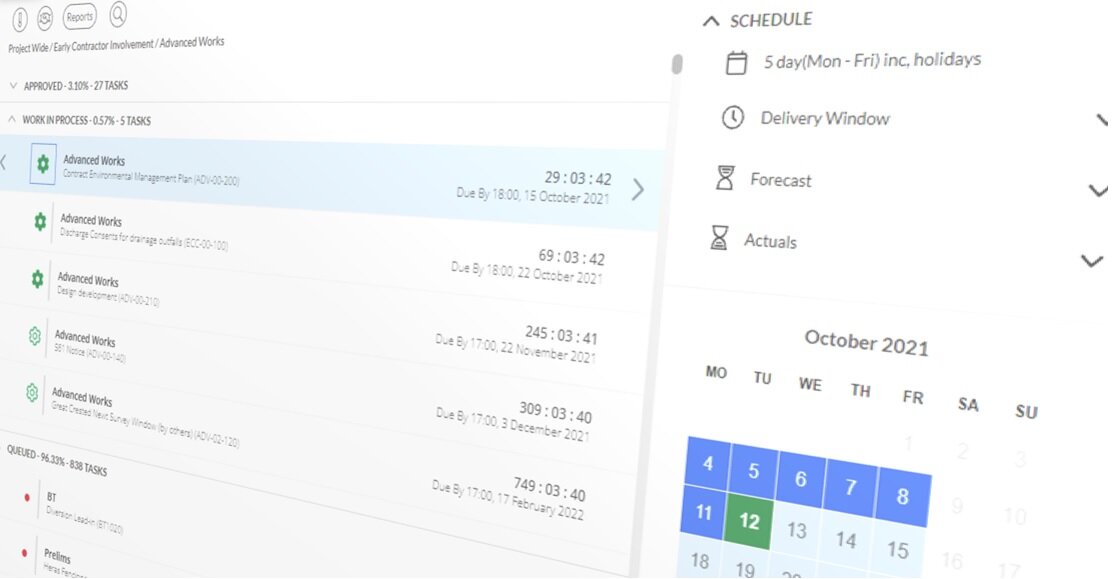
We improve productivity, benchmark performance and predict demand on infrastructure projects
Our Services
We Coach.
We can provide coaching on any aspect of effective project controls to project teams looking to enhance their current capability. Coaching can be done remotely or on site and is tailored to individual client requirements.
We Assure.
This service is available to both project managers and contractors who require a positive intervention on an existing project controls process. For example , we can operate a watching brief on a project to ensure that the contract programme is being effectively administered.
We Deliver.
We’d love to join your team and can provide a range of services to bolster your project including creating, maintaining and changing contract programmes, earned value management, quantitative risk analysis and implementation of acceleration measures.

Use FlowLedger to accelerate your project today
Tanner Project Management are proud to be the sole delivery partner for FlowLedger, the construction workflow app.
FlowLedger’s recommendation engine delivers an optimal project delivery plan using a unique type of pull system that focuses the team on the work that really matters right now. Let us know if you’re interested implementing this solution on your project.
Lean Six Sigma is at our core
We use the DMAIC (define, measure, analyse, improve, control) model which is the core aspect of lean six sigma process improvement. It boosts client satisfaction and reduces costs, leading to revenue growth and improved productivity. In short, DMAIC sets a course for where the construction industry need to be in terms of world class project delivery.
Define.
In Define the fundamentals of establishing a contract baseline are addressed by creating;
SMART tasks that clearly define the scope, then applying relationships that transform them from a comprehensive to-do list into an integrated strategy;
a work breakdown structure aligned with the cost breakdown structure to facilitate earned value management;
compliance with both the defined scope and the contract requirements to ensure each programme submission is accepted promptly.
Measure.
In Measure the schedule, cost and resource baselines are established, along with the hierarchy of records to ensure an objective record of progress is captured; including accruals where cost is concerned..
Analyse.
Once cost and / or other units of measurement are assigned to the schedule, both actual and forecast values can be categorised as ahead or behind schedule and over or under budgeted units. This is earned value analysis or EVA, a comprehensive and powerful way to assess project performance objectively.
In addition, when risk and uncertainty are applied to the schedule the probabilistic dates for completion can be determined; this quantitative schedule risk analysis or QSRA will inform whether there is sufficient risk contingency between planned and Contract completion.
Improve.
In contract families like the NEC the accepted (contract) programme is multigenerational, this provides multiple opportunities for pivoting and accelerating.
Reforecasting reduces the balance of risk, as the accepted programme transitions from theoretical to evidence based;
Pivoting should be considered when a delay to completion is forecast which is not grounds for compensation;
if grounds for compensation exist then an acceleration strategy at the client’s acquiesce should be employed.
Control.
It is almost inevitable that a Contractor is impeded from undertaking the original scope during the course of a construction project. External factors and changes to the scope will inevitably necessitate a change to the delivery strategy. Accepted programmes are used as baselines for impacting compensation events. How they are scoped, impacted and communicated is key.
“Tanner’s expertise proved essential on this most challenging of projects (HS2).”
— Nigel Hailey, Project Director for Arup
Our Clients
Pouring oil on the water.
My ancestor, Richard Behenna, was a sailor in the merchant navy. In 1856 he was returning to England from Peru when his ship, having successfully navigated the notorious Cape Horn, encountered a storm in the North Atlantic, find out how his story inspired our mission by clicking here.
Rhys Tanner, Founder



